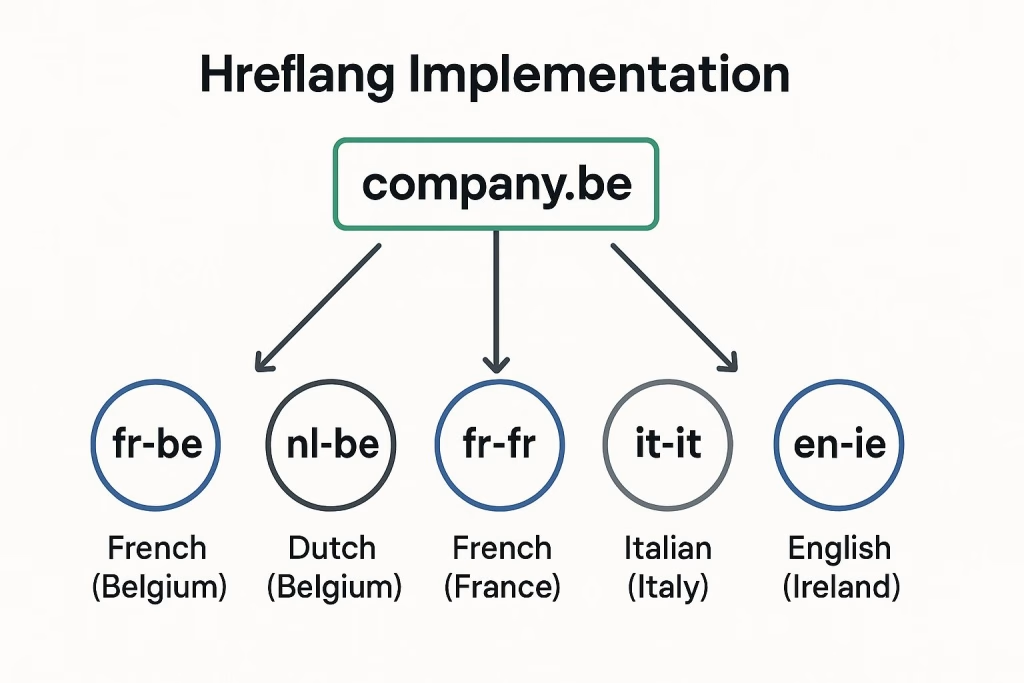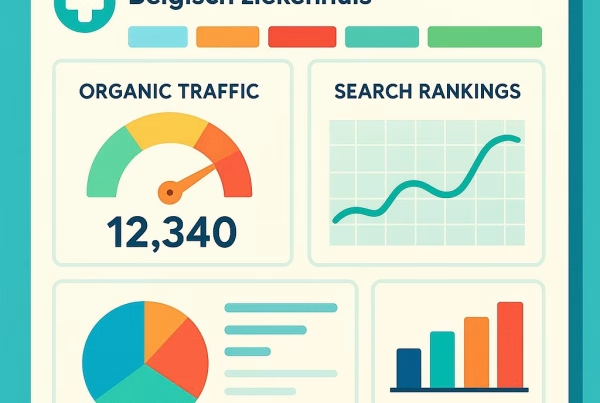Belgium‘s unique multilingual landscape presents both incredible opportunities and complex challenges for businesses looking to expand internationally. With Dutch, French, and German as official languages, Belgian companies already have a head start in understanding multi-market dynamics—something that becomes crucial when scaling SEO efforts across borders.
Last month, I worked with a Brussels-based logistics company that was struggling to rank in neighboring markets despite having a strong domestic presence. Their mistake? Treating international SEO like a simple translation exercise. The reality is far more nuanced, and Belgian businesses are uniquely positioned to master this complexity.
Understanding Belgium’s SEO Advantage in Global Markets
Belgian companies possess an inherent understanding of cultural and linguistic diversity that many single-language markets lack. This experience becomes invaluable when crafting international SEO strategies that resonate with different audiences.
The multilingual nature of Belgium means local businesses already understand how search behavior varies between language groups. A French-speaking user in Wallonia searches differently than a Dutch speaker in Flanders, even for the same product. This insight translates beautifully to international markets.
Consider how Semrush’s international SEO research shows that localized content performs 6x better than generic translations. Belgian companies already practice this principle domestically.
Core Components of Multi-Market SEO Strategy

Technical Infrastructure for International Expansion
Your technical foundation determines whether your international SEO efforts will succeed or fail. Belgian companies expanding internationally need to make critical decisions about domain structure, hosting, and technical implementation.
Domain Strategy Options:
- Country Code Top-Level Domains (ccTLDs): .nl for Netherlands, .de for Germany
- Subdirectories with gTLD: yoursite.com/nl/, yoursite.com/de/
- Subdomains: nl.yoursite.com, de.yoursite.com
A mid-sized Belgian manufacturing company I consulted chose subdirectories for their expansion into France and the Netherlands. Within six months, their organic traffic from these markets increased by 340%. The key was maintaining domain authority while clearly signaling geographic targeting to search engines.
Hreflang Implementation for Multi-Language Markets
Hreflang tags become absolutely critical when targeting multiple countries and languages. Belgian companies have an advantage here—they’re already managing multiple languages domestically.
Essential Hreflang Considerations:
- Language-country combinations (nl-BE vs nl-NL)
- Handling dialect differences (French in Belgium vs France)
- Default language fallbacks for unsupported regions
Market Research and Keyword Localization
International keyword research goes beyond translation. Each market has unique search patterns, local competitors, and cultural nuances that affect search behavior.
Market-Specific Research Framework:
- Local competitor analysis in target markets
- Cultural keyword variations and preferences
- Search volume differences between markets
- Local search trends and seasonality patterns
For instance, while Belgian companies might target “logistiek” in Dutch markets, German audiences primarily search for “Logistik” with different competitive landscapes and user intent.
Competitive Analysis Across European Markets
Understanding your competitive landscape changes dramatically when expanding internationally. A company dominating Belgian search results might find themselves competing against entirely different players in neighboring markets.
Identifying International Competitors
Your domestic competitors might not be your international ones. German companies dominating .de search results could be completely unknown in Belgium, yet they’ll be your primary competition when expanding eastward.
Competitive Intelligence Strategy:
- Market-specific SERP analysis
- Local competitor content strategies
- Backlink profile comparisons across markets
- Social media presence evaluation by country
Gap Analysis for Market Entry
Every market presents unique opportunities that domestic competitors might miss. Belgian companies can leverage their multilingual expertise to identify these gaps more effectively than monolingual competitors.
According to Ahrefs’ international SEO guide, companies that conduct thorough gap analysis before market entry are 3x more likely to achieve first-page rankings within 12 months.
Content Localization Beyond Translation
True localization requires understanding cultural context, local business practices, and market-specific pain points. Belgian companies excel at this because they already navigate cultural differences between Flemish and Walloon markets.
Cultural Adaptation Strategies
Content that works in Brussels might fall flat in Amsterdam or Paris. Each market has distinct communication styles, business etiquette, and decision-making processes.
Localization Elements to Consider:
- Currency and pricing displays
- Local business hours and contact preferences
- Cultural references and imagery
- Legal compliance and disclosure requirements
A Belgian e-commerce client expanded to Germany using their existing French content structure but adapted messaging to German directness preferences. Their conversion rates in Germany exceeded Belgian performance by 23% within four months.
Building Market-Specific Authority
Authority building varies significantly across European markets. LinkedIn dominates B2B networking in Belgium and Netherlands, while XING holds stronger influence in German markets.
Authority Building Tactics by Market:
- Guest posting on local industry publications
- Participating in market-specific forums and communities
- Building relationships with local influencers
- Earning mentions from regional news outlets
Technical SEO for Multi-Market Expansion
Site Speed Optimization Across Regions
Page speed expectations vary across European markets, and hosting decisions significantly impact international performance. Belgian companies need strategic approaches to serve content efficiently across multiple countries.
Technical Performance Strategies:
- Content Delivery Network (CDN) implementation
- Regional hosting considerations
- Image optimization for different connection speeds
- Mobile performance optimization by market
International Site Architecture
Your site structure needs to accommodate multiple markets without creating confusion for users or search engines. Belgian companies often struggle with this transition from domestic to international architecture.
Structural Considerations:
- Navigation clarity across language versions
- URL structure consistency
- Internal linking between market versions
- Mobile responsiveness across different devices and preferences
Measuring Success Across Multiple Markets
International SEO success requires sophisticated measurement approaches that account for market differences and varying competitive landscapes.
KPI Framework for Multi-Market Campaigns
Standard metrics don’t tell the complete story when operating across multiple markets. Conversion rates, engagement patterns, and search behavior vary significantly between Belgian, Dutch, French, and German audiences.
Essential Metrics by Market:
- Organic visibility trends by country
- Market-specific conversion rates
- Local search rankings for key terms
- Cross-market user behavior patterns
Attribution and Reporting Challenges
Tracking international SEO success becomes complex when users interact with multiple market versions of your site. Belgian companies need robust analytics setups to understand cross-border customer journeys.
One logistics client discovered that 34% of their German customers initially found them through Belgian search results before converting on the German site version. This insight completely changed their attribution model and budget allocation.
Common Pitfalls and How to Avoid Them
Over-Reliance on Translation Tools
Machine translation creates content that technically communicates your message but lacks the nuance needed for SEO success. Belgian companies understand this principle from managing Dutch and French versions domestically.
Translation Pitfalls to Avoid:
- Direct keyword translation without local research
- Ignoring local search intent variations
- Missing cultural context in content creation
- Overlooking local competitor strategies
Underestimating Local Competition
Many Belgian companies assume their domestic success will translate directly to international markets. Each market has established players with strong local SEO foundations and cultural understanding.
Insufficient Localization Investment
Successful international SEO requires ongoing investment in local market understanding, content creation, and relationship building. One-time translation projects rarely achieve sustainable results.
Building Your International SEO Roadmap
Phase 1: Market Selection and Research (Months 1-2)
Start with markets where Belgian companies have natural advantages—Netherlands for language similarity, France for cultural familiarity, or Germany for business relationship opportunities.
Initial Research Activities:
- Market opportunity assessment
- Competitive landscape analysis
- Technical infrastructure planning
- Resource requirement evaluation
Phase 2: Technical Implementation (Months 2-4)
Establish your technical foundation before creating content. Poor technical implementation can undermine even the best content strategies.
Technical Priorities:
- Domain structure implementation
- Hreflang tag deployment
- Analytics and tracking setup
- Performance optimization
Phase 3: Content Development and Launch (Months 4-8)
Create market-specific content that addresses local needs while maintaining brand consistency across markets.
Content Development Focus:
- Local keyword integration
- Cultural adaptation
- Authority building content
- User experience optimization
Phase 4: Optimization and Scaling (Months 8+)
Use performance data to refine strategies and expand to additional markets based on proven success patterns.
Final Verdict:
Here’s the thing about Belgian businesses—you’ve already been juggling multiple languages and cultures for years, which gives you a serious edge over competitors who’ve never had to think beyond their home market.
If you’ve ever noticed how your Flemish customers search completely differently than your Walloon clients—even for identical products—you’re already ahead of most international SEO practitioners. The key lies in treating each international market as distinct while leveraging your multilingual expertise to identify opportunities that monolingual competitors miss.
Success requires patience, local market understanding, and commitment to genuine localization rather than simple translation. That everyday experience of switching between Dutch, French, and German conversations? It’s actually your secret weapon for cracking international markets that leave other companies scratching their heads.






